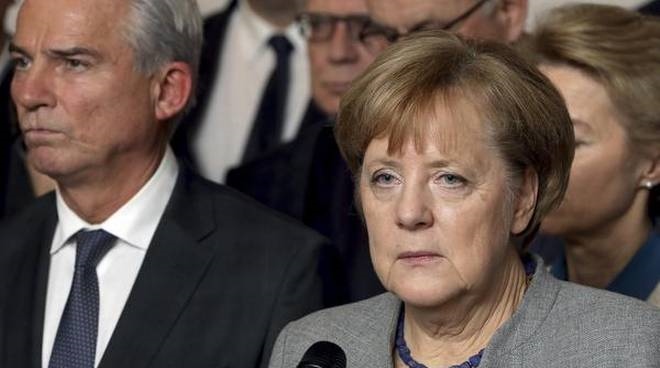Coalition Crisis in Germany
June 18, 2018 | Expert Insights

German Chancellor Angela Merkel’s coalition has come under stress following Interior Minister Horst Seehofer’s push to turn away refugees from Germany’s borders.
The CDU-CSU-SPD coalition requires support from the Interior Minister’s state of Bavaria, stronghold of CSU, to maintain a majority in the Bundestag (German parliament).
Background
After the fall of the Holy Roman Empire, the areas of Germania were divided into multiple smaller kingdoms. With Industrialisation and the policies of Otto Von Bismarck, Germany became a powerful force in Europe, however they lost both World Wars and paid heavy reparations.
West Germany’s rapid industrialisation, especially of steel and coal factories, set the pace for an economically advanced state. Welfare programmes for health, education and pension provided German youth with specialised skills and employment which sustained economic progress for years. Moreover, membership in the European Economic Committee helped define Germany’s powerful future role in the European Union.
Germany’s constitution established a parliamentary system of government that incorporated many features of the British system; however, since the Basic Law or Grundgesetz of West Germany created a federal system, unlike the UK’s unitary one, many political structures were drawn from the models of the United States and other federal governments.
The Bundestag, which consists of about 600 members is the cornerstone of the German system of government. It exercises much wider powers than the 69-member upper chamber, known as the Bundesrat (Federal Council). To amend the Basic Law, approval by a two-thirds vote in each chamber is required.
According to the principle of Cuius regio, eius religio ("whose realm, his religion"), the first type of religious refugee was established in the Holy Roman Empire. Before the 1782 Edict of Tolerance, religious refugees from the Habsburg Empire moved to other Protestant areas in the Holy Roman Empire. During the French Revolution, members of the French Counter-Revolution fled to German-speaking territories. After the fall of the Berlin Wall, people fled from countries facing civil war like Yugoslavia, Zimbabwe, Senegal and so on, to seek refuge in Germany. With a relatively low population growth rate, Germany was capable of admitting refugees.
Germany has ratified the Geneva Convention, including the 1951 Refugee Convention, which is a UN multilateral treaty that defines refugees, and sets out the rights of individuals who are granted asylum and the responsibilities of nations that grant asylum. However, many refugees do not fall under the ambit of the convention and are illegally settling in Germany.
In 2016, Chancellor Merkel announced they would follow a European-Turkish solution to the refugee crisis. The goal was to "noticeably and sustainably reduce the number of refugees, thus furthermore helping the people, who really need our protection". This goal was to be achieved by controlling the causes of movement, protecting the external borders of the EU, particularly the border between Greece and Turkey, and arranging an organised flow of the refugees.
Analysis
German Chancellor Angela Merkel is planning a special short-notice meeting with several other EU nations to deal with the migration crisis affecting the region after the fall of Austria, Hungary and Italy to populist forces closing their borders to refugees.
Interior Minister Horst Seehofer reiterated the right to turn away refugees. His main demand is that asylum seekers be turned back at the German border if they entered the EU in another country or have already applied for asylum in Germany and had their applications turned down.
"Nobody in the CSU is interested in toppling the chancellor, dissolving the CDU/CSU partnership or blowing up the coalition [between the CDU/CSU and the Social Democrats]," Seehofer said. "We want to finally find a sustainable solution to the rejection of immigrants from our borders.”
This issue has been central to the problem faced by southern states who accept refugees bound for “destination” states. Turning people away at the German border would potentially contravene EU "Dublin" regulations that determine which EU country is responsible for a particular asylum application.
Seehofer is increasingly leaning towards conservative, anti-immigrant counterparts like Chancellor Sebastian Kurz of Austria and Viktor Orban of Hungary. Nevertheless, he is positive that a compromise is on the table. “The cohesion of Europe is at stake as well as the cohesion of Germany. The situation is serious, but it can be overcome,” Seehofer wrote in a guest column for the Frankfurter Allgemeine paper.
Merkel is opposed to an overhaul of her 2015 “open door” policy. The act of defiance could threaten the coalition, even though Merkel herself has long enjoyed an overwhelming support from Germans. After 13 continuous years in power, Merkel continues to be a supreme force in German politics. However, the rise of far-right party Alternative for Germany (AfD) shows the strengthening of European fault lines based on populism and immigration. According to polls, 65% of Germans reject Merkel’s stance on migration and would like to see tighter controls at Germany’s borders.
It is important to note that at the height of World War II, the Middle East Relief and Refugee Administration (MERRA) operated camps in Syria, Egypt and Palestine where tens of thousands of people from across Europe sought refuge. As West Asian countries had opened their doors to European refugees, there is an onus on erstwhile colonial powers to provide asylum to those risking their lives on perilous waters to reach safe European shores.
Assessment
Our assessment is that Chancellor Merkel may have to compromise on the “open door” policy in order to maintain the fragile coalition in the Bundestag. We believe that Merkel will have to accept the position of her coalition partner CSU to take a less liberal stance on migration as it might be the best way to reduce support for the far right AfD.
Read more - Germany “watchful”








Comments